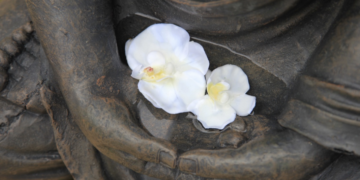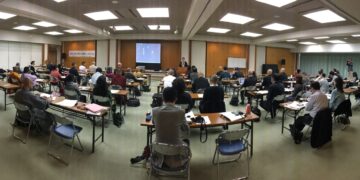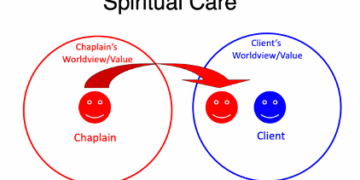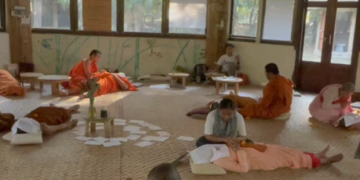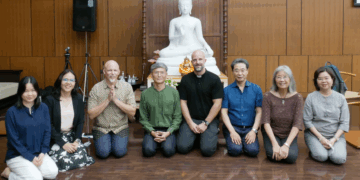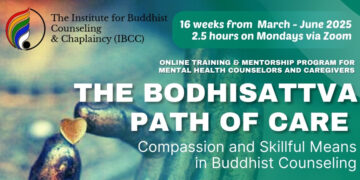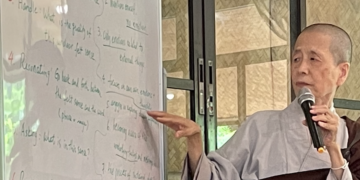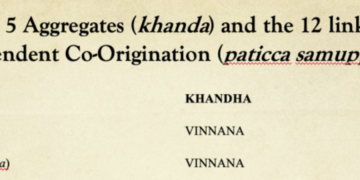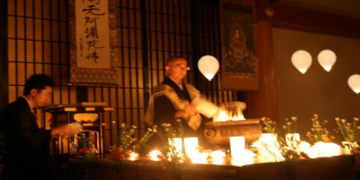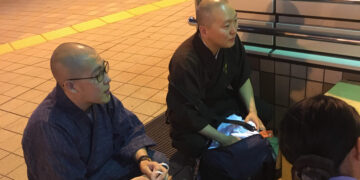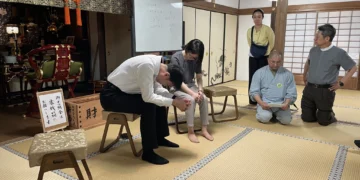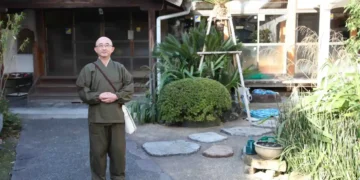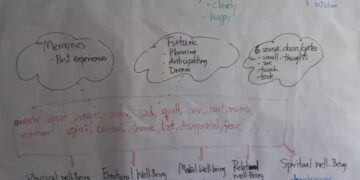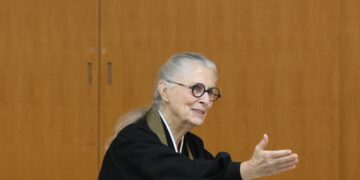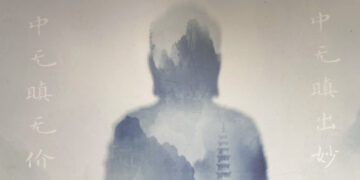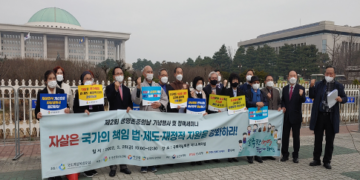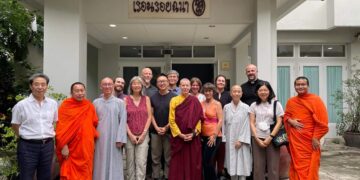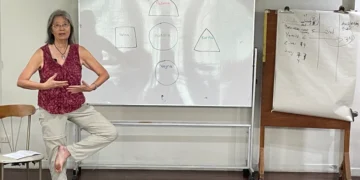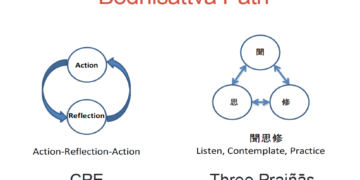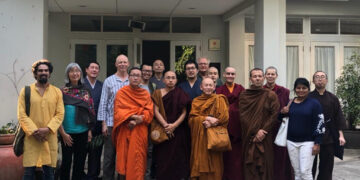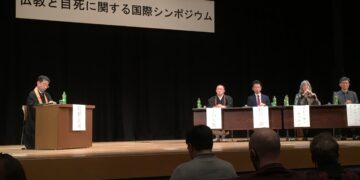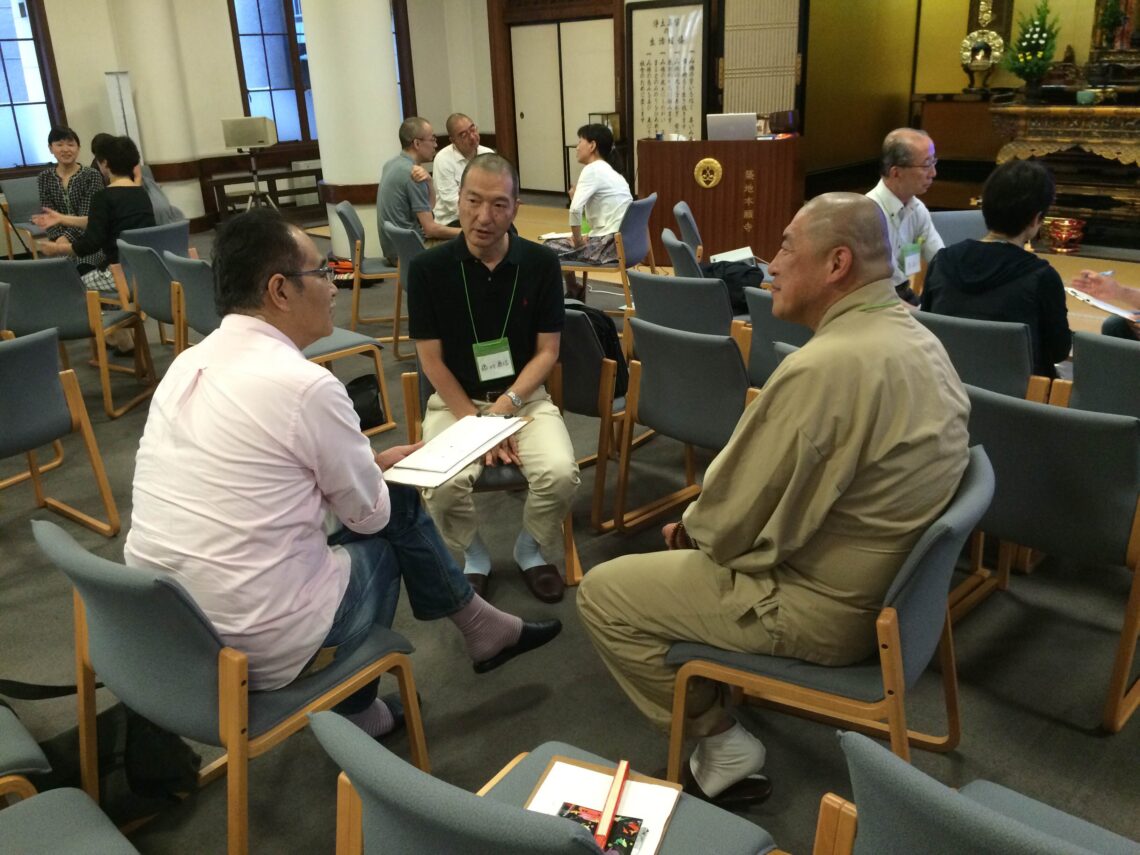The INEB Institute for Buddhist Chaplaincy (IBCC) is a cooperative, network organization that supports Buddhist chaplaincy training programs in Southeast and South Asia. Buddhist chaplaincy has been widely developed over the past 30 years in Europe and North America, first in end-of-life care and now in a wide range of fields. In East Asia, it has developed in Taiwan since the early 2000s, mostly in end-of-life care, and in Japan since the early 2010s in disaster trauma, end-of-life care, and suicide prevention.
The focus on Southeast and South Asia, then, is to support the systematic development of chaplaincy in these regions, which already have ancient traditions of monastic service and Buddhist psychology. In East Asia and the West, chaplaincy was developed to envigorate ossified systems of monastic training to transform monks/nuns from doctrinal preachers into compassionate listeners. This work also includes exposing lay Buddhists, many of whom are training as professionals in a variety of psycho-spirutual care disciplines, to the dynamically changing world of psycho-spiritual therapy. No longer dominated by Freudian models of cognitive therapy, contemporary therapies are increasingly integrating somatic and energetic practices from the yogic traditions of the East.
IBC will use the INEB model of decentralized management and support by not establishing a complex, centralized institition but rather working with partners in these regions to facilitate the establishment of local and regional training systems, and eventually Buddhist chaplaincy training institutions. In this way, IBC’s main activities will be: 1) to network Buddhist chaplain trainers around the world with organizations and networks in Southeast and South Asia to create a variety of Buddhist chaplaincy training programs that fit with local/regional needs and culture, and 2) provide financial support for these programs, which it is envisioned will cultivate the foundations for established programs and institutions in the future.
Background:
In 2006, the founder of IBC, Jonathan S. Watts, began working simultaneously on end-of-life care and suicide prevention at two different Buddhist institutes in Japan. The former lead to a major publication in Buddhist end-of-life care around the world entitled Buddhist Care for the Dying and Bereaved. This research was then funneled into the establishment of Japan’s first specifically Buddhist chaplaincy training institute in 2013 at the Rinbutsuken Institute for Engaged Buddhism. The latter formed part of the building of a nationwide network of Buddhist suicide prevention priests, who have developed their own regional training programs. In 2017, accessing the JNEB and INEB networks, the 1st International Conference on Buddhism, Suicide Prevention, and Psycho-Spiritual Counseling was held in Japan. This conference has led to further such meetings, held twice in Thailand in 2019 & 2023, and the establishment of smaller conferences and training workshops. As indicated in the title of the first conference, the themes have gone beyond suicide prevention to include chaplaincy training for Buddhist monastics and professional skills training in intergrated Buddhist-based psychotherapy.
Project Sites & Themes
Southeast Asia:
- Myanmar & Thailand: Monastic Chaplaincy Training (Theravada)
Experiencing Death without Dying: A Two-day Workshop on Suicide Prevention with Rev. Jotetsu Nemoto for Thai and Myanmar monastics (Wongsanit Ashram, Nakorn Nayok, Thailand, March 10-11, 2025) เวอร์ชั่นภาษาไทย
- Thailand, Cambodia, Vietnam, Malaysia, Indonesia: Urban Mental Health Care
South Asia:
- Himalaya (North India, Nepal, Bhutan)
Collaborations in Buddhist and Mental Health Approaches to Wellbeing: an introductory gathering for Himalayan monastics (Buddha Pada Institute, Kalimpong, India, December 5-7, 2024)
Maitri Space Awareness: Workshop & Retreat (Buddha Pada Institute, Kalimpong, India, December 10-15, 2024)
- India & Sri Lanka: Urban Mental Health Care
Trans-Regional:
On Line Course: The Bodhisattva Path of Care: Compassion and Skillful Means in Buddhist Informed Counseling (March 2025 for 16 weeks)
Public Symposium: Overcoming Contradictions in Psychotherapeutic & Spiritual Development in Buddhism (Bangkok, September 24, 2023).
Concepts & Practices in Chaplaincy: A 3-day Workshop for Buddhist Caregivers (Nakorn Nayok, Thailand, September 28-October 1, 2023)
Seminars & Resources:
During the COVID pandemic, we developed a series of intimate, private zoom webinars starting in September 2021 amongst a group of 13 persons who are largely alumni from the first two conferences held in Japan in 2017 and Thailand in 2019. In our early meetings, we clarified an interconnected set of issues and interests, which we have been studying in depth since then.

-
- Neurobiology & Mindfulness with Jinji Eika Willingham (U.S.A.) and Dr. Prawate Tantipiwatanaskul (Thailand). Dr. Prawate focused on the neurobiology of trauma, how the brain and memory process in trauma, and how mindfulness helps in the healing process. Jinji focused on how she translates and incorporates mindfulness into Buddhist-based psychotherapy for clients with trauma/PTSD through implicit or explicit awareness of neurobiology, systems, and helping them develop the experiential practice of self-regulation and co-regulation (neuroception) to maintain connection with others. November 19, 2021
-
- Buddhist Chaplaincy in North America, Japan, and Beyond with Rev. Fuminobu Komura (Japan/U.S.A.) and Prof. Elaine Yuen (U.S.A.). Rev. Komura discussed his path to becoming a Buddhist chaplain, how chaplaincy is the Buddhist path, and how he regards the role of prayer in his chaplaincy work. Elaine discussed “Mapping Buddhist Chaplains in North America – Chaplaincy Innovation Lab”. Buddhist-trained chaplains are increasingly becoming a presence in North America, and this project is a first step in documenting chaplains’ Buddhist identities, their professional and clinical education, and where and how they are employed. December 17, 2021
-
- Buddhist Meditation Practice for the Traumatized and Mentally Ill with Ven. Zinai (Taiwan) and Rev. Soin Fujio (Japan). Ven. Zinai presented various meditation Vipassana practices: 1) using visual ‘Open Focus’ to shift the mode of a narrow focus to open focus, 2) short version of practicing mindfulness in body, feelings, minds, and thoughts, 3) mindfulness of breathing meditation, and 4) discerning impermanence and non-self in mindfulness of breathing and body scan. She also gave a short introduction on how to help meditators to overcome their negative/traumatized experiences using Eugene Gendlin’s “Focusing” method. Rev. Fujio has worked with the suicidal and mentally ill for many years. He presented not only on Zazen, practiced while sitting on a cushion or chair, but also Dozen, Zen meditation through movement, based on his 40 year practice of Tai-Chi as a master of Yan Ming-Shi school. He also introduced Ritsuzen, Zen meditation in a standing position, and Gazen, Zen meditation in a lying or sleeping position. Rev. Fujio Soin on Breathing and Mind January 21, 2022
-
- Suicide Prevention & Spiritual Friendship (kalyanamitra 善知識) with Rev. Gustav Ericsson (Sweden). Gustav spoke on the significance of friendship on the spiritual path, building from an etymological exploration of the word religion, traditional and contemporary images of pastoral care, as well as Buddhist and Christian scriptural references to the significance of friendship on the spiritual path. He also presented examples and reflections from his years of pastoral counseling and service in the Church of Sweden’s suicide prevention helpline, as an invitation to discussion and sharing on the meaning and relevance of friendly connection in suicide prevention work and spiritual/contemplative counseling. February 18, 2022
-
- Family Systems Therapy & Mentalization—Practicing Mindfulness and Vipassana in the Family with Jinji Willingham (USA) and Rev. Masazumi Okano (Japan). Jinji discussed the three components of her therapeutic orientation and clinical model – the dharma, family systems, and neuroscience (the neurobiology of relational attachment, its impact on the autonomic nervous system which impacts mental health, esp. trauma, mood disorder, and self-harming behaviors). She discussed how they are aligned and how they emerge and how I integrate them in clinical work. Rev. Okano gave a talk entitled “Mentalization—Practicing Mindfulness and Vipassana in the Family.”The concept of mentalization originates in psychoanalysis, and, since the early 1990s, the Hungarian-born psychologist Peter Fonagy and his colleagues have revitalized it, making it relevant and applicable for the everyday lives of families. Normally these meditations are practiced in order to be aware of one’s own mental and physical processes but we could purposefully apply them to enhance mentalization. This could contribute not only to enhancing children’s inter-relational skills but also the skills of those who are engaged in various care-giving activities. In this way, it may be useful to apply the ideas of mentalization in order to open up new dimensions to mindfulness and vipassana. March 25, 2022
-
- Suicide Prevention in South Korea with Prof. Pumsoo Lee and two colleagues: Prof. Seunghee Lim who holds a Ph.D from Birmingham University and is presently a professor at the Shinhan University Social Welfare Department. She is also the President of the Korean Academy of Culture for Life. Prof. Myoung Ho Hyun is a clinical psychologist and Professor in the Department of Psychology at Chuna-Ang University. Prof. Lee spoke specifically on the 2nd Life Respect Day Celebration and Policy Seminar sponsored by the Korea Life Movement Union. April 15, 2022
-
- Maitri Space Awareness with Prof. Elaine Yuen (U.S.A.). This practice evolved from the Tibetan yoga tradition by Chogyam Trungpa Rinpoche. Developed in the early 1970s, Maitri Space Awareness practice is built around the mandala of the five buddha families, illustrating how the ordinary world of mind and emotions is full of wakefulness as well as confusion. The word maitri is a Sanskrit word that translates as “loving kindness” or “unlimited friendliness toward self and others”. The practice of Maitri Space Awareness is intended to evoke inherent compassion and offers the opportunity to be with experience from a ground of non-aggression. Maitri Space Awareness has been taught as workshops, and is also a core element of the MA Counseling degrees at Naropa University. May 20, 2022
-
- Teaching Meditation: from physical comportment to psycho-spiritual balance and insight. & How do you evaluate the development of your meditation students and those that you work with? June 22 & July 22, 2022
-
- “Wise Hope” with Roshi Joan Halifax, Buddhist teacher, Founder and Head Teacher of Upaya Zen Center in Santa Fe, New Mexico, a social activist, and author. In her early years, she was an anthropologist at Columbia University (1964-68) and University of Miami School of Medicine (1970-72). She is a pioneer in the field of end-of-life care. She has lectured on the subject of death and dying at many academic institutions and medical centers around the world. November 18, 2022
-
- Wellbeing and Social Movement Building with Ouyporn Khuankaew, a Buddhist feminist activist and has been a workshop facilitator in Asia since 1995. She facilitates workshops on feminist counseling, sexuality and anti-oppression, peacebuilding, and nonviolent direct action with Thai NGOs and government workers as well as with regional and international participants. She also guides meditation retreats for activists. Prior to the International Women’s Partnership for Peace and Justice (IWP), she ran the gender program of the International Network of Engaged Buddhists. January 20, 2023
-
- Exploring the Intersections between Gendlin’s Focusing Therapy & the Buddha’s Teachings of the Five Aggregates & Dependent Co-origination with Ven. Zinai and Jonathan S. Watts. Ven. Zinai (Taiwan) was ordained in 1983 by the renowned bhiksuni Master Wuyin and Venerable Xinzi. Her works focuses on integrated Buddhist Abhidhamma studies, mindfulness meditation practice, creative education method based on Image Theory, and Satir’s Family Therapy Model. Jonathan S. Watts (U.S.A./Japan) studied and practiced at the forest monastery of Buddhadasa Bhikkhu in Thailand during the 1990s. Since 2006, he has helped to develop Japan’s first Buddhist chaplaincy training program, the Rinbutsuken Institute of Engaged Buddhism, where he teaches Buddhist social analysis and systems care. March 15, 2024
Annotated Bibliography for Buddhist Counseling and Suicide Prevention

